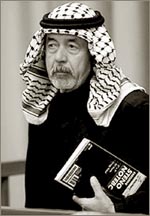|
observer |
|
|
|
|
|
OTHER LINKS |

|

|

|
Hussein's voice speaks in court in praise of atrocities
The courtroom he dominated for 15 months seemed much smaller last week without him there to mock the judges and assert his menacing place in history. But the thick, high-register voice of Saddam Hussein was unmistakable. In audio recordings made years ago and played 10 days after his hanging, Mr. Hussein was heard justifying the use of chemical weapons against the Iraqi Kurds in the late 1980s, predicting they would kill "thousands" and saying he alone among Iraq's leaders had the authority to order chemical attacks. In the history of prosecutions against some of the last century's grimmest men, there can rarely have been a moment that so starkly caught a despot's unpitying nature. On one recording, Mr. Hussein presses the merits of chemical weapons on Izzat Ibrahim al-Douri, his vice-president, and now, the Americans believe, the fugitive leader of the Sunni insurgency that has tied down thousands of American troops. Mr. Douri, a notorious hard-liner, asks whether chemical attacks will be effective against civilian populations, and suggests that they might stir an international outcry. "Yes, they're very effective if people don't wear masks," Mr. Hussein replies. "You mean they will kill thousands?" Mr. Douri asks. "Yes, they will kill thousands," Mr. Hussein says. Before he was hanged Dec. 30 for offenses in another case, Mr. Hussein had used the so-called Anfal trial, involving the massacre of as many as 180,000 Iraqi Kurds, as a platform for arguing that the chemical weapons attacks of the kind that devastated the town of Halabja on March 16, 1988, were carried out by Iranian forces then fighting Iraq in an eight-year war. But the recordings told another story. Court officials gave no hint as to how they obtained the recordings, which Iraqis familiar with Mr. Hussein's voice said seemed to be authentic. But they appeared to have been made during meetings of his Revolutionary Command Council and of the Baath Party High Command, two groups that acted as rubber stamps for his decisions. Mr. Hussein regularly ordered meetings to be recorded, according to Iraqis who knew the inner workings of Mr. Hussein's dictatorship. Mr. Hussein sounds matter of fact as he describes what chemical weapons will do. "They will prevent people eating and drinking the local water, and they won't be able to sleep in their beds," he says. "They will force people to leave their homes and make them uninhabitable until they have been decontaminated." As for the concern about international reaction, he assures Mr. Douri that only he will order the attacks. "I don't know if you know this, Comrade Izzat, but chemical weapons are not used unless I personally give the orders," he says. When Iraq resumed the genocide trial of its former leaders on Monday, Mr. Hussein's high-backed, black vinyl seat at the front of the dock was left ominously empty. Something about the six remaining defendants, including Ali Hassan al-Majid, Mr. Hussein's cousin, who was known among Iraqis as Chemical Ali for his role in overseeing the attacks on the Kurds, suggested that they felt orphaned without the commanding presence of Mr. Hussein. Gone were the cries of "Mr. President!" as Mr. Hussein entered the court to join them in the dock, and gone, too, was the emboldened posture they took from Mr. Hussein, with frequent challenges and insults to witnesses, prosecutors and judges. Perhaps Mr. Hussein's hanging, and the humiliating taunts he endured from witnesses and guards as he stood with the noose around his neck, had broken the last illusions among those surviving him that they could somehow evade a similar end. When the chief judge, Muhammad Ureibi al-Khalifa, began the proceedings by abruptly cutting the microphone as Mr. Majid stood to intone a prayer in memory of Mr. Hussein, the former dictator seemed to be judicially, as well as existentially, dead. But the anticlimactic beginning swiftly gave way to the most astonishing day of testimony since Mr. Hussein and his associates went on trial. Once more, it was Mr. Hussein, this time in an involuntary orgy of self-incrimination, who dominated. In the sequence of scratchy recordings ? some with the dialogue quite clear, some barely decipherable ? Mr. Hussein repeatedly showed the ready resort to brutality that seized Iraq with fear during his 24 years in power. At one point, he is heard telling a general to summarily execute field commanders who fail to adequately prepare their defenses against Kurdish guerrilla raids. He cites as a precedent "some commanders who abandoned their positions when they found themselves in an awkward situation, who deserved to have their necks cut, and did." At another point, he tells subordinates to execute any internal security officials who fail to stop Iraqi soldiers sneaking home from the Iranian front on fake passes. "If you arrest any of them, cut off their heads," he says. "Show no mercy. They only joined the security to avoid having to join the army and fight Iran." The prosecutor, Munkith al-Faroun, came to court as almost the only person who attended Mr. Hussein's execution on Dec. 30 to emerge with an unsullied reputation. It was he, as he and others confirmed, who attempted to halt the taunts hurled at Mr. Hussein as he stood with the noose around his neck, moments before the trapdoor opened. Over the hubbub, an illicit camera phone recording showed Mr. Faroun calling out for silence, "Please, no!" he said. "The man is about to be executed." But back in the courtroom, Mr. Faroun became, again, the man holding Mr. Hussein to account and, in one poignant moment, counselling restraint among those who have expressed outrage over the manner of the former ruler's execution. That moment came after the court watched television images taken after the Halabja attack, which more than any other event focused world attention on the atrocities committed under Mr. Hussein. NY Times |











